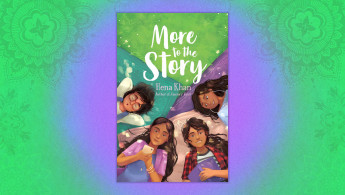More To The Story: A Pakistani-American tale of navigating life and its changes
More To The Story is a middle-grade novel by award-winning author Hena Khan. Set in Atlanta, Georgia, USA, this story follows a Pakistani-American family, the Mirzas, its four sisters: Maryam, Jameela, Bisma, and Aleeza, and how they navigate significant life changes.
The book is an enjoyable read that caters well towards its target audience yet is rich enough to be enjoyed by more mature readers.
The book starts with an Eid celebration, allowing readers to glimpse the diasporic South Asian Muslim tradition.
This Eid, Jameela’s father is out of town for a job interview, and the girls struggle to accept his absence because “it doesn’t feel like Eid. Baba’s not here”.
In this way, Khan also subtly highlights the dilemma many Muslims in the West sometimes face during Eid when they have to forfeit celebrating with their family. Still, the family tries to enjoy the day by inviting friends to celebrate.
Jameela, the main narrator in More To The Story, is the second daughter of the Mirza family. She is a 6th grader and an aspiring journalist — already an assistant editor — and was recently appointed as the features editor for her school newspaper. Jameela is outspoken and opinionated and feels emotions quite strongly.
These traits help her excel as an aspiring journalist but can also be detrimental when not channelled properly. Many factors come together to push Jameela’s emotions to a high: her editor-in-chief, Travis, keeps shooting down her article ideas; her younger sister, Aleeza, is too spoiled; and Baba suddenly has to move abroad for a job.
Still, Jameela’s character growth throughout this story is impressive. She grows more aware of herself and her emotions.
After sharing a heart-to-heart with her mother, she admires and looks up to her more, saying, “I don’t know how Mama controls her anger. Mine is gnawing away at my heart, making it smaller”.
Coming to terms with her anger and finding a safe space to examine it through the help of her parents facilitates such tremendous growth.
When one of her sisters suddenly develops a significant illness, Jameela channels her love for journalism into growing her empathy and cultivating ways to support her sister.
This experience also helps her learn the importance of community and showing up for loved ones. Jameela also uses journalistic skills to regulate her emotions following Baba’s move abroad.
For her first story as a Features Editor, she writes a spectacular story – to impress Baba – about a new student in her school.
The new student, Ali, is the nephew of Uncle Saeed (a friend of the Mirzas) from London. Ali has moved to Atlanta ahead of his mother and sister following the demise of his dad.
Through this character, Jameela learns the importance of journalistic integrity and how to help loved ones navigate grief.
While highlighting Ali’s character, it is pertinent to note how I appreciate the conscious effort that Khan put into avoiding focusing too much on Islamophobia in More To The Story.
It is still amply explored through Ali’s experiences while living in London.
The only eyebrow-raising moment in this book is a scene that unfolds with the illness diagnosis that turns the family’s world upside down.
Jameela lies in bed with her younger sister, Bisma, and hears her mother praying Fajr; she considers getting up to join her but doesn’t for fear of disturbing Bisma’s sleep; instead, she prays hard from her bed.
I appreciate Jameela’s prayer afterwards because it portrays a soft relationship with God without any anxiety or irrational fear.
However, I cannot help but feel like this scene loosely compares Solah to praying (dua), thus somewhat trivialising the former. Islam is important to these characters, so it would have been more poignant if more emphasis had been placed on Jameela’s relationship with this vital pillar of Islam (Solah).
That eyebrow-raising moment is numbed by how well Khan crafted Jameela’s parents. They are such brilliant examples of warm parenting, a significant diversion from the typical immigrant parenting many may be familiar with.
They do not project the frustration of life challenges onto their kids and leave ample room to validate and talk through their kids’ emotions.
For example, when Jameela approaches her mother with worries about her father’s job, money and healthcare costs, her mother immediately validates and reassures her – despite how overwhelmed she is with the same things. “I’m so sorry, baby. You do not need to be thinking about this… I didn’t realise you were anxious. I should have paid more attention. I was busy working extra hours… You can always come to me with whatever is on your mind,” — not forgetting how their support helps Jameela navigate her growing anger.
In Jameela’s parents’ relationships with their children, even adult readers can benefit immensely from the many lessons in More To The Story.
Overall, More To The Story is a well-rounded and thoroughly enjoyable book.
Stories like this remind us that Muslim children are regular kids who experience regular emotions and that Islamophobia is not the start or end of their lived experiences.
Aisha Yusuff is a book reviewer focusing on African and Muslim literature. Her work can be found on @thatothernigeriangirl as well as in digital magazines like Rewrite London.
Follow her on Twitter: @allthingsaeesha



